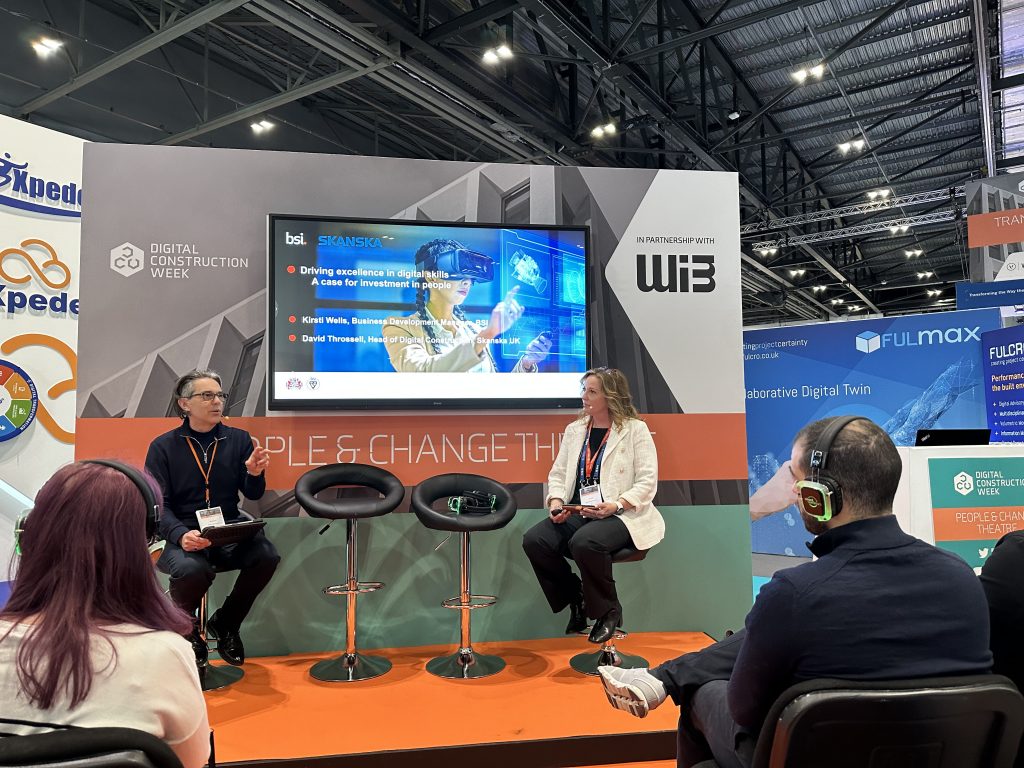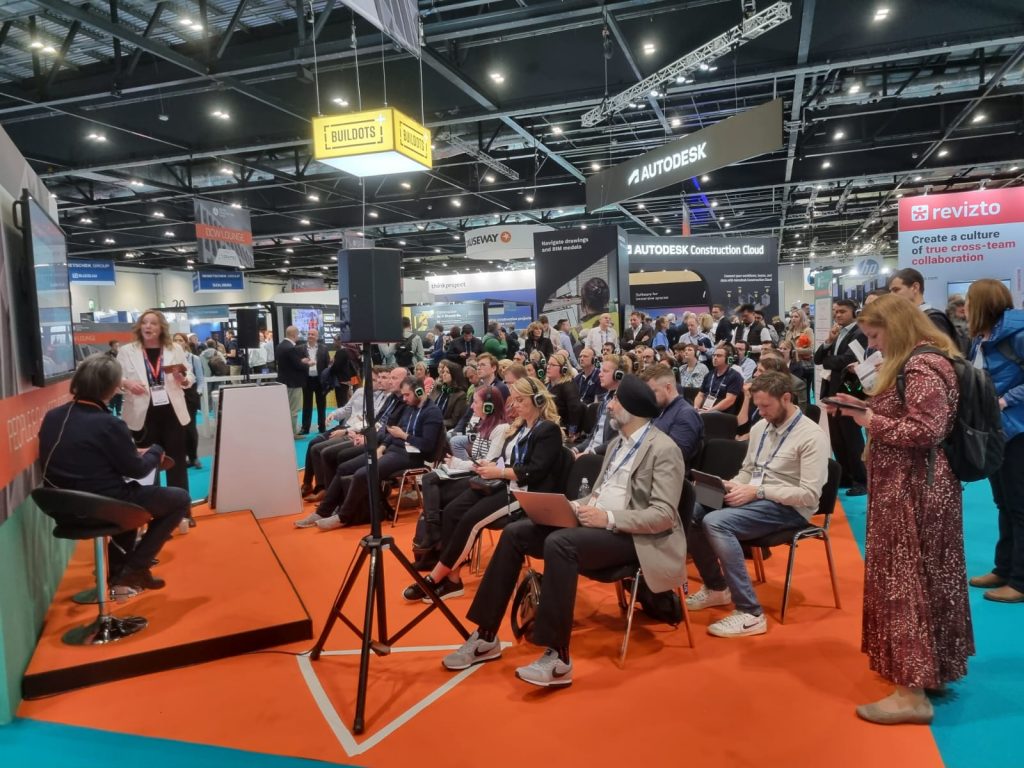Kirsti Wells, UKI Business Development Manager at the British Standards Institution (BSI), discusses the importance of developing digital skills in the built environment sector.
Joined by David Throssell, Head of Digital Construction, Skanska UK, they explore the push for progressive digitalisation and the real people who sit behind it.
The industry is looking to a digitally-enabled future. And it’s not just about getting to grips with the latest software or deep-diving into BIM (Building Information Modelling); it’s about embracing a whole new way of thinking. A well-trained workforce, fluent in digital tools, will help the industry champion quality and success and retain its talent.
Kirsti Wells and David Throssell presenting the themes mentioned in this article on-stage at Digital Construction Week 2023.
The value of a digitally skilled workforce
The future isn’t just about innovative new platforms; it’s about fostering a digital mindset. As digitally-enabled technologies take us further into a connected world, we must remember the human skills at play in the background. Investing in digital skills is akin to investing in the sector’s very future.
“We want to connect with the humanised aspect of skills and training,” explains Wells. “While we explore innovative platforms, immersive technologies and new concepts, from a training perspective, we must also focus on our people: their development and passion for their future.”
David Throssell discusses Skanska UK’s recent organisational digitalisation and the key drivers (such as the Building Safety Act and project bidding requirements) to showcase competency from a procurement perspective. On investing in their people, Throssell says: “Skanska UK has recently rolled out full BIM pathway models for 52 delegates, from managers through to document controllers. Our objectives are not only to showcase competency from a procurement perspective but to get our staff on to competence pathways.”
Attracting and retaining talent in our industry
The fluidity within the sector raises a pertinent question: how do we retain the talent we attract? Wells emphasises that this responsibility lies heavily with the employers. While training, competency, and skill development are paramount, they shouldn’t merely be checkboxes. True retention stems from a blend of continuous engagement, fostering a culture of inclusivity, and showcasing potential growth pathways. Investing in apprentices is more than a financial decision—it’s a commitment to embedding a digital-first culture, ensuring longevity in their roles.
While the world is heading towards a digital revolution, the humans behind the screens, buttons, and processes remain the actual drivers. Wells continues, “The focus should be as much on their passion, development, and journey as the technology itself.”
While showcasing recent successes is crucial for companies like Skanska UK, it’s not just about proving competency. Aligning with organisations like BSI is about championing a larger narrative where the industry is proactive about the digital future. Skanska UK has advocated for its people through technology, training and development, which has proven to drive creativity and efficiency. And as such, Skanska UK is one of the first organizations globally to achieve the BSI Kitemark for innovation.
Kirsti Wells and David Throssell presenting the themes mentioned in this article on-stage at Digital Construction Week 2023.
What does quality mean?
Quality is not just about the end product; it’s about every step that leads to it. And quality can mean something different to everyone from an educational perspective. Quality for a document controller might centre around accuracy and data, while quality for a client-facing role would entail communication skills. It looks different to everyone. “We always think of quality as a process, product, or service, which it usually is,” continues Wells, “but do we consider what it really means to individuals and how they achieve it?”
In a world where everybody learns differently, at BSI, we work collaboratively to offer learning solutions for all, from online and on-demand to in-house training. “It’s about investing in our people and providing them with the tools and knowledge they personally need to thrive,” reiterates Wells. Training and qualifications embed new skills and expertise as we progress towards a more resilient and sustainable future.
Cultural shifts and innovations
While digitalisation plays a crucial role in our industry’s evolution, it’s important to recognise the broader cultural shift that underpins these changes. The introduction of new technologies has necessitated an adjustment in the skills we value and how we work together. We’ve seen this in the growing importance of flexible working arrangements, an increased focus on sustainability, and the need for a more inclusive organisational culture.
But it’s not enough to merely adapt; we must also be proactive. We must prioritise lifelong learning and skill development, providing a solid foundation to build a collaborative and forward-thinking workforce. This isn’t about preparing for a distant future but about equipping ourselves to thrive in the dynamic environment we find ourselves in today. By embracing the technological and cultural changes of our time, we can shape a more innovative, adaptable, and resilient industry.
 By DCW Connect
By DCW Connect
